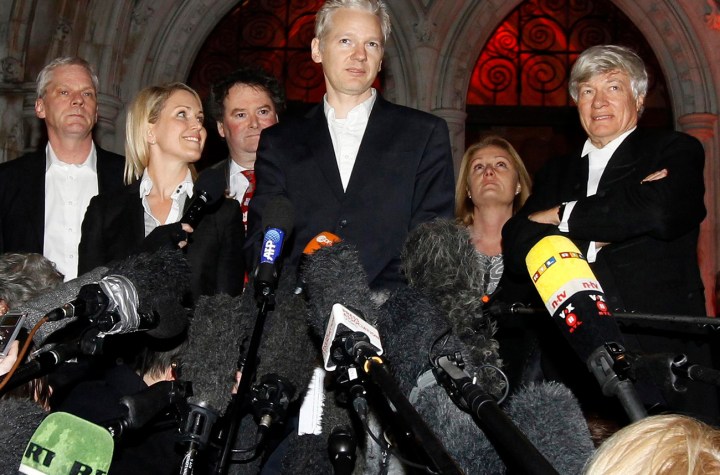Narrowly beaten as Time’s Man of the Year by Facebook’s Mark Zuckerberg, WikiLeaks frontman Julian Assange has been granted bail in Britain – with stringent conditions; still, extradition to Sweden seems a foregone conclusion. That should lead to kilometres of news stories in 2011 … and maybe a second bite for Time’s editors. By SIPHO HLONGWANE.
WikiLeaks frontman Julian Assange has been granted bail by a British court, under the strictest of circumstances. He may be out of jail, but extradition to Sweden grows likelier by the day. Assange himself asserts extradition to the US will be even likelier once he’s in Sweden.
After handing himself over to police in London and nine days in prison, Assange’s bail application was upheld on Thursday. Assange had previously been granted bail by a lower court, but the Crown Prosecution Service, acting on behalf of Swedish prosecutors, opposed the ruling. The High Court struck down the application against Assange’s bail, but imposed tougher restrictions on his movements.
Since his arrest last week, Assange has been batted back and forth by the British courts. The first bail hearing was heard immediately following his arrest, with the Westminster Court magistrate ruling that he posed too great a flight risk and was remanded in custody. On Tuesday, that was overturned by Assange’s lawyers, but the CPS appealed immediately, meaning Assange had to spend two more days in prison until the courts could make a final ruling.
Bail for Assange was set at £200,000, which was raised by his supporters, and he is under house arrest at the Norfolk house of former army Captain Vaughan Smith. The WikiLeaks boss is under curfew, must report daily to a police station and must wear an electronic tag at all times. The judge also refused to let Assange go unless five guarantors chosen by the court could be found. They eventually were all found, and include Sir John Sulston and the Marchioness of Worcester.
Crucially, Assange is not barred from using the Internet or otherwise communicating with the outside world while under house arrest.
High Court Justice Duncan Ouseley warned Assange the extradition effort by the Swedish authorities was likely to succeed and, if he tried to flee, he would be found “to have exploited quite ruthlessly those who have put their trust in him and to have let them down”.
Watch: Julian Assange speaks to the press after his bail application was upheld.
Assange is facing charges relating to sexual impropriety in Sweden. He maintains his innocence and claims the charges are an attempt by US authorities, in conjunction with the Swedish intelligence service, to smear his name and drag him to the US to face charges relating to leaking secret US information. “There is an ongoing attempt to extradite me to the US and that extradition is much more likely to occur if I am already in Sweden,” he said to Channel 4 News.
Sweden and the US have repeatedly denied that the charges in Sweden have anything to do with the mass of secret documents leaked by WikiLeaks.
US attorney general Eric Holder said there were ongoing attempts to find if there were grounds to indict Assange on charges of espionage. However, precedence is in Assange’s favour. In June 1971, the US Supreme Court ruled that a publisher cannot be prosecuted for publishing classified documents. Assange and WikiLeaks would be protected under this clause.
However, Holder also hinted they were looking to find any evidence Assange may have collaborated with or encouraged Bradley Manning, the army intelligence analyst who has been arrested for stealing and leaking the classified material to WikiLeaks, to steal the secret information. If they do find any evidence, Assange could be prosecuted as a leaker and not publisher of classified information, in which case he’d be in serious trouble. The law in the US does not protect those who leak classified information.
Assange is not completely without support in the US. A group of 19 Columbia professors wrote a letter to the US government, encouraging them not to prosecute Assange for publishing the classified documents. “We all believe that in publishing diplomatic cables WikiLeaks is engaging in journalistic activity protected by the First Amendment,” the letter says. “As a historical matter, government overreaction to publication of leaked material in the press has always been more damaging to American democracy than the leaks themselves.” The dons argue that legal pursuit of WikiLeaks would “greatly damage American standing in free-press debates worldwide and would dishearten those journalists looking to this nation for inspiration.” DM
Read more: The Guardian, The New York Times.
Main photo: WikiLeaks founder Julian Assange speaks to the media on the steps of the High Court, in London December 16, 2010. Assange was freed on bail on Thursday while he fights extradition to Sweden over allegations of sex crimes. REUTERS/Stefan Wermuth.


















